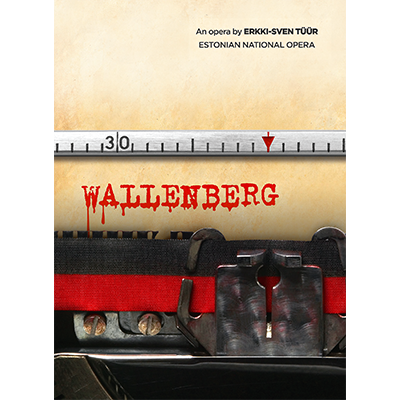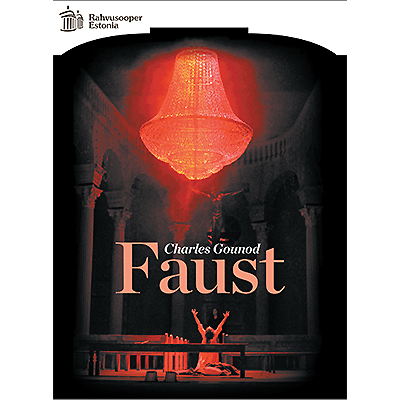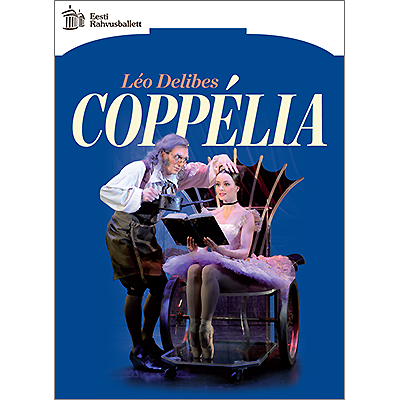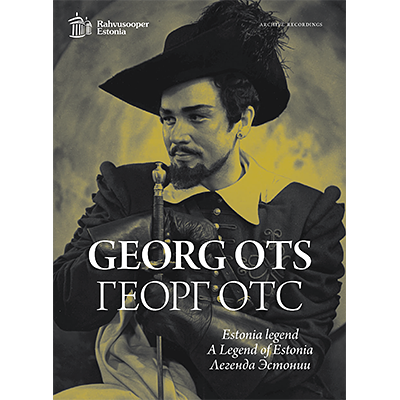
Great Maestros XVI–XVII: Beethoven – 250
November 9, 2020
Great Maestros XVIII-XIX
April 28, 2022THE COLOURS OF CLOUDS
Released on August 20th, 2021, premiere presentation on September 5th at the Estonian National Opera Theatre Fair
Opera by Rasmus Puur, based on Jaan Kruusvall’s play of the same name
Libretto by Laur Lomper, dramaturgy by Kristiina Jalasto and Mehis Pihla
 Conductor: Kaspar Mänd
Conductor: Kaspar Mänd
Stage Director: Roman Baskin
Designer: Ervin Õunapuu
Costumes Designer: Anu Lensment
Lighting Designer: Margus Vaigur
Video Designer: Argo Valdmaa
Chorus Master: Elmo Tiisvald
Assistant to the costume designer: Anu Rieberg
Assistant to the Stage Director: Silva Valdt
Consultant on Acting: Helgi Sallo
Movement Director: Hedi Pundonen
Pianists-Repetiteurs: Tarmo Eespere, Riina Pikani, Jaanika Rand-Sirp
Stage Manager: Riina Airenne
Cast:
 Kaarel, father: Jassi Zahharov
Kaarel, father: Jassi Zahharov
Ell, mother: Helen Lokuta
Lagle, daughter: Janne Ševtšenko
Kalev, son: Mati Turi
Maria, his wife: Juuli Lill
Maks, Lagle’s boyfriend: Raiko Raalik
Einrih, the speaker: Mart Madiste
Anna, grandmother: Ita Ever
Raivo, businessman/Security Guard: Priit Volmer
Maik (Mihkel), Lagle’s son: Fred Laansalu
Friends of Maks: Ake Lang, Sander Valk
Kostja, seller of waffles and burgers: Vjatšeslav Reznitšenko
Madis, KGB agent/Member of Parliament: Mati Vaikmaa
Üllar, Speaker of the Supreme Soviet of the ESSR: Mart Laur
Liilia Vaanaru : Maria Kais
Conductor of the song festival: Hirvo Surva
1st woman/Housewife: Kairi Tammaru
Extras: Einar Hillep, Ants-Kristjan Masing, Ranno Rätsep, Toomas Hark
Estonian National Opera Orchestra, Chorus and Boys’ Choir
Recorded live at the Estonian National Opera, February 18th and 20th, 2020 by ERR

I am free, I have free will,
I do what I want, when I want to.
I want to forget everything that came before,
and I only have a faint idea about what is coming.
I can go with whomever to wherever,
and come back alone or with somebody.
And I do not give a damn what others think,
that we’ve got the jackpot in our hands.
Freedom is like ecstasy,
lifting me up to the sky,
I entrust myself to an angel…
I am free, my will has no bounds,
I will fly off if I truly want to.
You have to seize the day, there is no time.
Let the stormy winds carry me high!
Freedom is like ecstasy,
lifting me up to the sky,
I entrust myself to an angel…
Lagle’s Aria of Freedom, Act 1
Dear audience!
For me, this opera, was an attempt to understand the time when the most important decisions of today’s Estonia were made. I believe that most of my contemporaries have somewhat envied those who lived during the revolutionary times of late 1980s and early 1990s. After all, it all seems so exciting, passionate, extraordinary – just like youth. Or maybe it stems from a desire to visit an era when things were rather unsettled?
In creating The Colours of Clouds, the hardest part was getting a feel for that time. My good friend, librettist Laur Lomper was of great help in this regard. I needed to create a world, both in terms of sound and speech, that would reflect this period in time as well as incorporate aspects of the present because I cannot completely overlook my own experiences. As a result, this opera might sound a bit extrinsic, amusing and simple, as we are more cynical and ironic with regard to sincere (or cliché) feelings, ideals and dreams. However, it is always easier being cynical than it is being sincere. Try the latter for a change!
For whom was Estonia’s independence restored if everyone now longs to move abroad? Why do we now take our freedom for granted if we had to fight for it for hundreds of years? Do we need a real or a fictional enemy from our own ranks to unite? We have never lived in this country as simply Estonians – would we even be capable of it? Why do ideals fade so fast? We cannot answer these questions unambiguously but it is vital to ask them again and again. I hope we never tire of doing so.
Staging this opera brought me together with Roman Baskin, one of the pillars of Estonian theatre. A man whose intellect, energy, and passion for life seemed endless. Even during the rehearsal process, when he was plagued by serious illness, he never lost his strength or fastidiousness. As he himself put it: “You can’t make art when you are perfectly well.” He was willing to go all in to achieve his goals. It was also not until I started working with him that I realised that directing is an even lonelier profession than conducting.
As with all great teachers, it is very hard to put your finger on what it is exactly that they taught you, which is also the case with Roman. There is this clear perception, those bright moments, passionate discussions, inspiring ideas which left a mark on everyone who ever met him. The passionate and lively imprint that he left on us will live on.
Rasmus Puur, composer
My collaborative relationship with Roman began when I was still a composition student at the conservatory. In 1983, I wrote a song for choir, orchestra, and synthesizers and it was played at the end of Dürrenmatt’s The Physicists, which Roman staged. Later, I wrote music for the films Vernanda (1988) and Peace Street (1991), as well as the TV series M-Club (1995–1998). We became very good friends and never ran out of conversation topics. As a passionate person, he would never treat any topic with indifference, which is why we would often end up deep in conversation … He became more and more interested in music, especially orchestral music and conducting, which must have been the reason he decided to direct Fellini’s Orchestral Rehearsal (2004) and three operas. I still terribly miss our conversations …
Erkki-Sven Tüür, composer and a friend of Roman

COMMENTARY BY THE STAGE DIRECTOR ROMAN BASKIN
Let us talk a little about the play Pilvede värvid (The Colours of Clouds), staged by Mikk Mikiver at the Estonian Drama Theatre in 1983. It was a time when it was possible to quietly talk about the wounds of the past, and given the play’s success, Estonians needed it very much. It was performed in the days of the singing revolution…
Mikiver’s production was a milestone. Theatre means coming together, and this production brought us together in a dark theatre hall in a common desire for freedom. This production spoke to people. In addition to the tapestry hanging on the wall, with its glimmering blue-black-white colours, also the theme of leaving was vivid. There was no common understanding here, but the fact that it could be talked about gave an idea of the wind of freedom.
Pushing back from Kruusvall years later, both in the opera genre and in the context of regaining independence – does this speak of the need to draw back the attention to some of the pain points of society? What is Rasmus’ opera about?
The opera looks at the same family one generation further. The Mother has become the Grandmother, the Daughter has become the Mother, and so on. Strangely enough, the situation is the same: there is again an urge to escape. The motives are indeed different, but from whom/what or to whom/what the escape should be is not clear to the characters. The main motivation is fear – fear of oneself, fear that one may not be able to cope with freedom, and that true independence may prove too much to bear. In short, a real sense of family is still alien to young people; it is easier to follow the cult of strength, but unfortunately, it may not point in the right direction.
What touches and triggers you as a producer in Rasmus’ opera?
I was particularly touched by the fact that this young man took up the subject of leaving, that he was interested in why we cannot do anything sensible with freedom, or at least why we could not for a long time. Now, we have had more practice, but there is still a lack of real courage for independence.
For me, music is still the driving force. The lyrics help us to orientate ourselves better in the music, and the combination of the lyrics and the music may make different situations on stage more precise and easier to understand, but the gust of wind that drives the ship forward still comes from the music. The problem with the dramatic genre is that you have to think up the music yourself and tie it together with an invisible thread, but you have to have that supporting breeze, otherwise the emotional side gets lost.
What would you say to the audience about The Colours of Clouds?
Well, is it not still the case that the production itself speaks best, and if it does not, then there is no point in speaking? But if I were to give a travel recommendation on my part, I would, of course, recommend making an excursion into our own recent history and looking together into a funhouse mirror that can get uncomfortable at times.

SYNOPSIS
Act 1
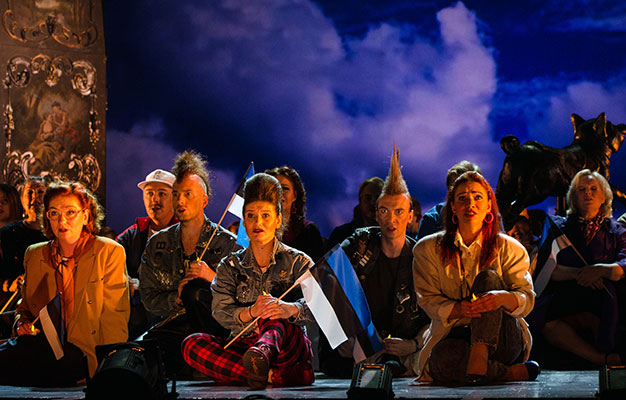 It is the second half of the 1980s. With Mikhail Gorbachev taking power, perestroika starts and the Molotov-Ribbentrop Pact is made public. Conflicts arise between rebellious punks and Soviet officials.
It is the second half of the 1980s. With Mikhail Gorbachev taking power, perestroika starts and the Molotov-Ribbentrop Pact is made public. Conflicts arise between rebellious punks and Soviet officials.
At the same time, Kaarel and Ell are living in their seaside farm. They are worried about their daughter Lagle who has once again not spent the night at home. When Lagle finally does appear, it is only to take her things and leave. The parents forbid Lagle to leave but the girl, enamoured by the idea of freedom, declares that no one can stop her or order her around. Ell and Kaarel’s son Kalev arrives home with his wife Maria. Lagle insults them both: Kalev for being part of a party and Maria for being a foreigner. Lagle then leaves – to fight for freedom, of course.
People, fighting for independence, become increasingly fearless. They gather at the Song Festival Grounds. They make speeches and demand an end to their subjugation. Both Lagle and Kalev are there, one of them boldly in the front row, the other anonymously in the crowd. Lagle meets a seemingly nice young man called Maks.
Kalev, inspired by the idea of freedom, returns to his parents’ home, eager to work. He has left the party and wants to begin repairing his parents’ farm. Lagle and Maks arrive on a motorcycle and Lagle introduces the young man to her parents. A picture of Maks and Lagle riding a motorcycle in front of the stage and waving the blue-black-white flag is on the front pages of newspapers. Lagle takes her things and wants to leave with Maks, but father does not allow it. Lagle announces that she is pregnant.
People form the Baltic Chain. The former party member Kalev is suddenly a spokesperson for patriotism.
Autumn arrives. Ell and Kaarel’s farm is busy making apple juice. Kalev’s wife Maria feels that she is not wanted in this country. Lagle advises Maria to return to her home country. Maks has left Lagle and the young woman has to raise her son Mihkel (Maik) alone. Lagle announces that she is planning to go to Sweden where aunt Krõõt is already waiting for her. Maria tells Kalev, who has just entered the room, about Lagle’s plan. Kalev thinks that going to Sweden is a good idea but Maria disagrees.
Ell and Kaarel enter the room and Kaarel orders Lagle to stay. The girl mistakenly thinks that Maria has betrayed her and does not realise that her father just meant the living room. Lagle announces that she intends to flee to Sweden. Her parents are not having any of it. Grandmother, who has thus far listened quietly, begins to speak.
Act 2
 Ell reads to Kaarel and Kalev a letter from Lagle, in which she describes her life in Sweden. Kalev wants to look for a job in the city. Working in his parents’ farm seems aimless to him. Ell and Kaarel reveal that they have decided to leave the farm to Kalev. Kalev agrees. A coup has started in Moscow and Kalev rushes into the city to help restore the independence of the state.
Ell reads to Kaarel and Kalev a letter from Lagle, in which she describes her life in Sweden. Kalev wants to look for a job in the city. Working in his parents’ farm seems aimless to him. Ell and Kaarel reveal that they have decided to leave the farm to Kalev. Kalev agrees. A coup has started in Moscow and Kalev rushes into the city to help restore the independence of the state.
Even though the Estonians are already in the midst of a political tug of war, independence is successfully declared.
Kaarel and Ell are at home. Kalev calls to his parents to see the new house that he had built for them with money from his metal trade. Kalev’s so-called business partners arrive. Kalev retreats to the back room, but is forcibly brought out. He has been scammed – the last train of metal has disappeared. Kalev pawned his parents’ farm and land for this deal, and now they are threatening to take it all away. The parents offer them grandfather’s gold to pay off their son’s debt but it is not enough.
It is the Youth Song Celebration. Ell and Kaarel look for Lagle who promised to come home for the celebration. At the same time, Lagle and Maik try to get closer to the stage like before, but the security guard does not allow it. Lagle and her parents reunite. Ell and Kaarel have not seen their grandson Maik for a long time. They ask him to say hello but the boy does not know what to do and starts singing loudly in Swedish.
Kalev’s business troubles have not improved in the least. For his own protection, he flees to Russia and takes Maria with him. Kaarel and Ell, who are forced to move out of their farm because of the debt, hope that Lagle will stay home. However, Lagle is resolute – her life is in Sweden. Ell and Kaarel are afraid that they will die alone but Maria returns to stay.
Mehis Pihla, dramaturge

Video director – Erle Veber
Assistant – Ivika Paart
Consultant – Lauri Sirp
Sound engineer – Teet Kehlmann
Chief cameraman – Raul Priks
Bullet Dolly operator – Ergo Treier
Technocrane operator – Esper Kaar
Cameramen – Meelis Kadastik, Margus Voolpriit, Peeter Tungal, Magnus Suitso, Janno Arro
Assistant sound engineers – Virgo Mäe, Algis Pauljukaitis, Andres Olema
Outside broadcasting “MOON” – Siim Vardja, Märt Viisileht, Peeter Trisna, Ando Võsuri
Video editing – Erle Veber, Andres Lepasar, Rasmus Lill
Recording producer – Ruth Alaküla
Assistant producer – Lota Viik
Authoring – Kert Pallo
DVD authoring and mastering – Priit Pärg
Photos – Harri Rospu
Booklet compiled by Liina Viru
Design – Mart Kivisild
Co-producer – Johannes Vähi
Producer – Peeter Vähi
Special thanks: Ott Maaten, Aivar Mäe, Karmel Killandi, Rein Mikk
Total time: 133 min
Stereo, 16:9, PAL, Region: All
Booklet and subtitles in Estonian and English
ERP 12421
© 2021 Estonian National Opera, ERR & Estonian Record Productions








